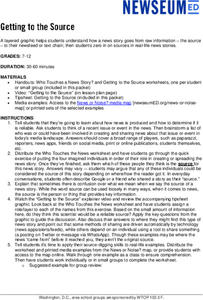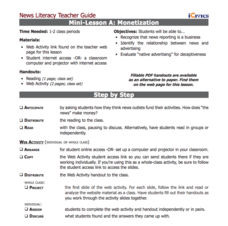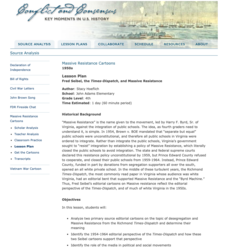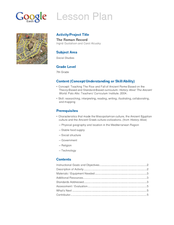Roald Dahl
Matilda - The Third Miracle
Magnus takes a visit to the classroom in the 20th chapter of Matilda. Or does he? After reading, learners interview the person in the hot seat to get a detailed account of what happened during this chapter. Then, they write individual...
Newseum
Getting to the Source
Reliable news stories are based on facts from reliable sources. Young journalists learn how to evaluate the reliability of news sources by watching a short explainer video. Teams apply their new source-digging skills to a current news...
Newseum
Media Ethics: Fairness Formula Starts With Accuracy
As part of a study of media ethics, young journalists apply a fairness formula to news reports. They look at accuracy, balance, completeness, detachment, and ethics to determine if the reporting is fair.
News Literacy Project
News Goggles: Quotes in News Reports
To quote or paraphrase? That is the question examined by a 29-slide presentation on the importance of including direct quotes in news reporting.
Advocates for Human Rights
All about Me!
Celebrate the uniqueness of your students with this character building lesson plan series. In order to learn about and appreciate diversity and individuality, children create All About Me books by cutting out and drawing pictures that...
Council for the Curriculum, Examinations and Assessment
Managing Influences and Making Decisions
Internal and external factors influence behavior and decision making. The third session in a 10-lesson series focusing on Social, Physical, Emotional, Cognitive and Spiritual (SPECS) health explores the impact of these factors and...
Ashbrook Center at Ashland University
Ratification of the Constitution
How difficult was it to get everyone to agree on the contents of the Constitution? Historians analyze the task of the Founding Fathers in creating the United States Constitution. They research a directory of video clips, primary sources,...
Teaching Heart
100th Day News!
Can you believe there have already been 100 days in the school year? Help your learners document their time in your class with a newspaper format. They write about the 100 Day celebrations, as well as drawing what they will look like in...
PBS
Facts vs. Opinions vs. Informed Opinions and their Role in Journalism
Do reporters write about what they see, or what they think? Examine the differences between investigative writing and opinion writing with a lesson from PBS. Learners look over different examples of each kind of reporting, and convince...
Royal Conservatory of Music
The Anti-bullying Magazine
Get the word out about friendship, support, and a safe school community with a media literacy lesson about bullying. Young journalists investigate instances of bullying and take descriptive pictures as they compile a magazine to fight...
iCivics
Mini Lesson A: Monetization
Advertising is everywhere! Does your class know that their attention span is for sale, even when they're watching a simple news story? The second installment in a five-part series from iCivics examines the relationship between news...
Roy Rosenzweig Center for History and New Media
Fred Seibel, the Times-Dispatch, and Massive Resistance
A lesson plan challenges scholars to analyze editorial cartoons created by Fred Seibel, illustrator for the Times-Dispatch, during the Massive Resistance. A class discussion looking at today's editorial pages and Jim Crow Laws leads the...
Teachers Network
Witness for the Prosecution: Online Newspaper
Agatha Christie's Witness for the Prosecution becomes the text for an online newspaper activity. Young journalists craft news, features, obituary, and opinion articles based on the characters and events in the play.
EngageNY
Revising the Newspaper Article: Sentence Structure and Transitions
Take two. After a mini lesson covering sentence structure and transition words, scholars revise their End of Unit 3 Assessment based on feedback. Writers self-score their assessments against row three in the Newspaper Article Rubric.
EngageNY
Performance Task: Final Draft of the Newspaper Article
It's time for the grand finale! Scholars complete the final draft of their newspaper articles for the End of Unit 3 Assessment. They share their article with a classmate for peer critique. After considering all feedback and including a...
EngageNY
Researching: Eyewitness Accounts, Part 2
Continue on. Learners continue with the work they began in the last lesson looking for quotes to complete an eye witness interview. Pupils work in their groups to examine the texts in their research folders and The Great Earthquake and...
Franklin D. Roosevelt Presidential Library & Museum
Pearl Harbor Activity #5: The Medium Matters
Young journalists learn that how we get our news and information matters in a collaborative social studies activity. The class is divided into three groups with the first analyzing a transcript of FDR's "Day of Infamy" speech, the second...
Curated OER
Once a fact, always a truth
Students discover there are many sources of accurate and inaccurate information. They use newspapers and, in small groups, develop a statement explaining why they believe the article is accurate or inaccurate.
Curated OER
Newspaper Articles
Seventh graders summarize a newspaper article. For this writing lesson students choose a newspaper article about an environmental issue. The students summarize the article and devise a solution to the environmental issue.
Curated OER
The Daily Athenian: A Greek Newspaper Project
Students work together to gather information from the internet and print sources about the Ancient Greeks. They discover what everyday life was like in Ancient Greece. They develop a newspaper to share the information they gathered.
US Mint
Absolutely and Relatively: The Puerto Rico Quarter Reverse
How much does your class know about Puerto RIco? How much can they learn from the back of a 2009 quarter? Use the coin, part of a series of quarters that depict US territories, to teach learners about the geography, culture, and history...
Curated OER
Cartoons for the Classroom: China, Tibet and the Olympics
In this current events worksheet, students analyze a political cartoon about the Olympics in China and respond to 3 talking point questions.
Curated OER
Cartoons for the Classroom: Campaign Fundraising
In this current events worksheet, students analyze a political cartoon about American campaign fundraising and respond to 3 talking point questions.
Teachers' Curriculum Instituted
The Roman Record
Using Google Earth, Google Docs, and other Google Tools, collaborative groups of seventh graders research and then create and share online newspapers reporting on the early development, geographical features, political issues, and family...
Other popular searches
- Main Idea Using Newspapers
- Lessons on Using Newspapers
- Using Newspapers in Geograpy
- Summary Using Newspapers
- Activities Using Newspapers
- Using Newspapers in Geography
- Games Using Newspapers
- Lesson Plans Using Newspapers

























